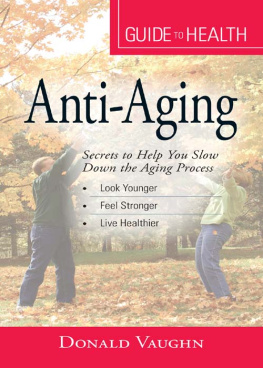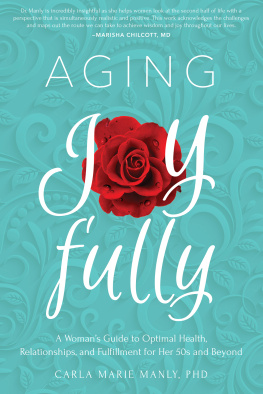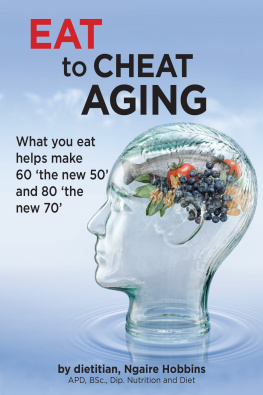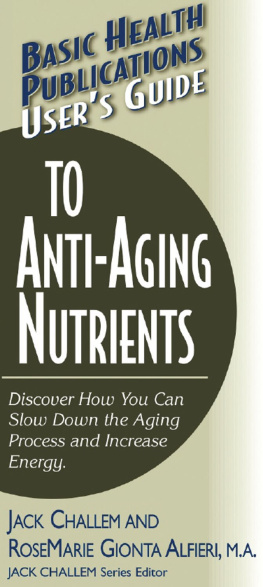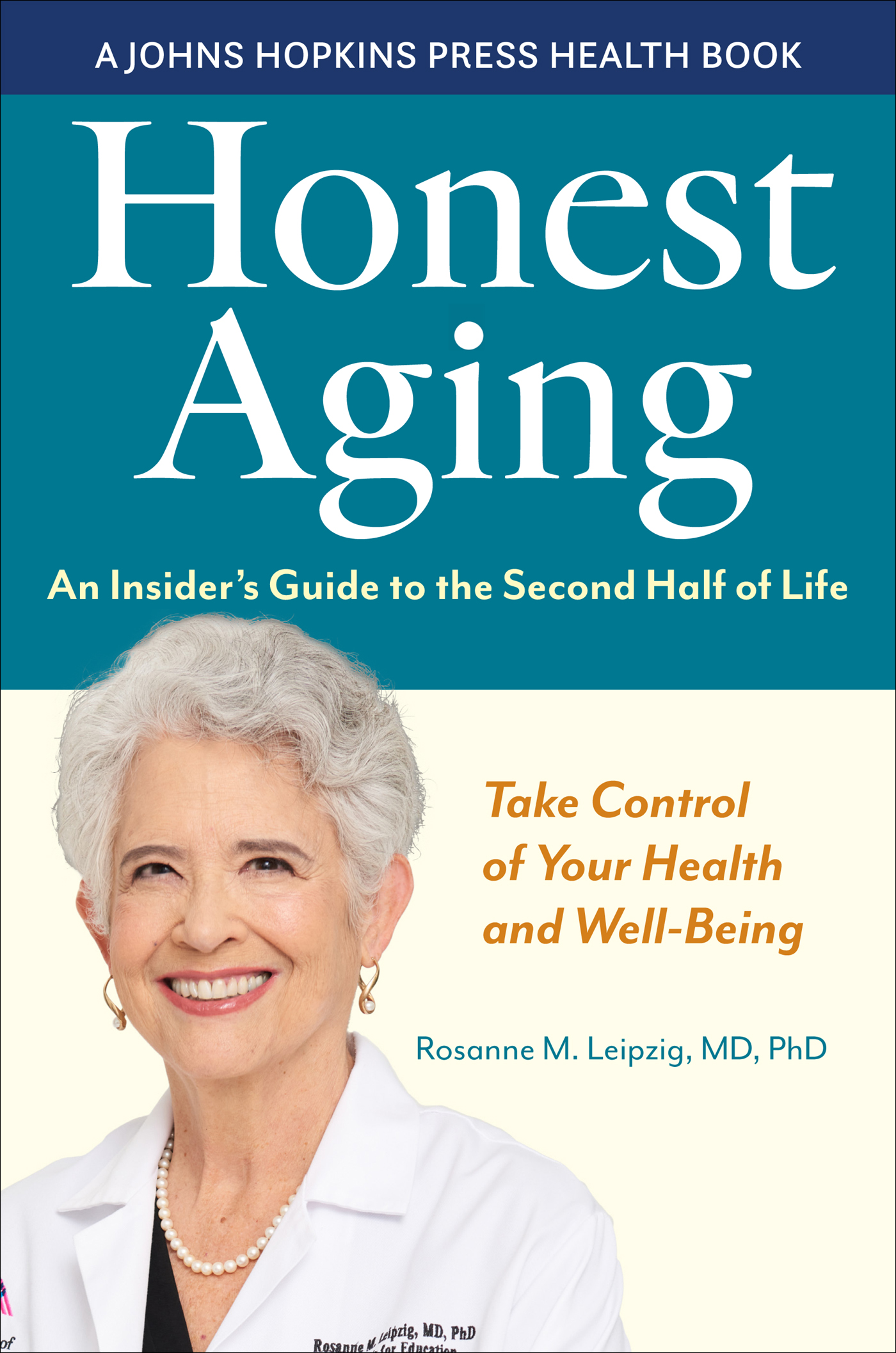Contents
Guide
Honest Aging
A Johns Hopkins Press Health Book
Honest Aging
An Insiders Guide to the Second Half of Life
ROSANNE M. LEIPZIG, MD, PhD

JOHNS HOPKINS UNIVERSITY PRESS
Baltimore
Note to the Reader: This book is not meant to substitute for medical care, and treatment should not be based solely on its contents. Instead, treatment must be developed in a dialogue between the individual and their physician. The book has been written to help with that dialogue.
Drug dosage: The author and publisher have made reasonable efforts to determine that the selection of drugs discussed in this text conform to the practices of the general medical community. In view of ongoing research, changes in governmental regulation, and the constant flow of information relating to drug therapy and drug reactions, the reader is urged to check the package insert of each drug for any change in indications and dosage and for warnings and precautions. This is particularly important when the recommended agent is a new and/or an infrequently used drug.
2023 Rosanne M. Leipzig
All rights reserved. Published 2023
Printed in the United States of America on acid-free paper
9 8 7 6 5 4 3 2 1
Johns Hopkins University Press
2715 North Charles Street
Baltimore, Maryland 21218
www.press.jhu.edu
Library of Congress Cataloging-in-Publication Data
Names: Leipzig, Rosanne M., 1951 author.
Title: Honest aging : an insiders guide to the second half of life / Rosanne M. Leipzig, MD, PhD.
Description: Baltimore : Johns Hopkins University Press, 2022. | Series: A Johns Hopkins Press health book | Includes bibliographical references and index.
Identifiers: LCCN 2021062978 | ISBN 9781421444697 (hardcover) | ISBN 9781421444703 (paperback) | ISBN 9781421444710 (ebook)
Subjects: LCSH: Aging. | Older people. | Geriatrics. | Popular works.
Classification: LCC HQ1061 .L4556 2022 | DDC 305.26dc23/eng/20220104
LC record available at https://lccn.loc.gov/2021062978
A catalog record for this book is available from the British Library.
The illustrations in this book, including modifications and adaptations, were created by Jane Whitney unless otherwise noted.
Special discounts are available for bulk purchases of this book. For more information, please contact Special Sales at .
To my grandmother, Gussie Gordon, and my wife, Ora Chaikinmy role models for how to adapt to ones new normal
Preface
I am a geriatrician, a specialist in the care of older adults. In my 40 years of practice, the number one question that Im asked by patients, families, at parties, or when sitting next to someone on an airplane is Is this normal for aging? This can be a change in physical appearance, a new symptom or behavior, or difficulty doing something thats never been a problem before. Theres a world of subtext in these questions: Is this a sign of a serious chronic illness? Is this the start of dementia? Will this kill me? Will this make it impossible for me to live independently? Can anything be done about this?
What is normal? Dictionary definitions include usual or typical. Normal doesnt mean theres never a cause for concern, or that theres nothing that can be done to make things better. Normal age-related changes can affect what you do day-to-day and how you feel, both physically and emotionally. Were lucky to live at a time when so many adaptive devices and technologies are available. When you turn 40 or so, you develop blurred vision while doing close-up work, reading, using the computer, or sewing, for example. This is called presbyopia. It is normal, and hopefully you will respond by getting glasses to correct your vision. Without glasses, you wouldnt be able to live a normal life, and your new visual impairment would become a disability. We dont usually think of glasses as assistive devices, yet they are, just like canes or hearing aids. These devices can make an enormous difference in the quality of our lives as we age; however, this will happen only if we recognize how they improve our function and ability to engage with the world when using them.
How you react to age-related change determines how you will live. People age in different ways. Some fight it tooth and nail, denying that any changes are happening. Some are scared and anxious about every change they perceive. Some cave in, and some just keep living, looking at the changes as new and interesting challenges. The same holds for family and friends who have their own fears and concerns about the safety and quality of life of their loved ones as well as the effects this process may have on their own lives. Both worry about how changes related to aging will affect their relationships with each other. It is my hope that the answers, ideas, and suggestions you find in this book will help you and those you love to be creative, resilient, and engaged in this, the second half of your life.
Birth is a beginning and death a destination;
But life is a journey.
A going, a growing from stage to stage:
From childhood to maturity and youth to old age.
F ROM L IFE I S A J OURNEY, BY A LVIN F INE
How to Use this Book
Honest Aging is a guide for you and your loved ones as you begin the next stage of your life. What should you expect as you age? Every person ages differently, yet there are common changes and challenges that all of us experience.
This book is not a prescription for aging backward or making 80 the new 60. It doesnt delve into DNA, telomeres, or other aspects of the basic science of aging. It is not a guide to self-diagnosis, nor should it substitute for regular visits with your medical provider. But it may come in handy when you and your practitioners are trying to figure out whether something is normal or if there are ways to help you function better.
This book is for older adults, their loved ones, and those who are curious about what to expect and who they can be as they age. Each chapter is written with an awareness and sensitivity relevant to each of these readers. For example, those concerned about their memory may not want to tell others, afraid that they will lose their autonomy and independence, but they still want information as to whether a loss of cognitive function is actually happening, and what they might do to limit it. Loved ones may not know how to discuss concerns about memory or make suggestions without engendering conflict. The curious run the risk of becoming worried well, focusing on potential problems rather than being proactive.
Part I of the book, Aging 101, focuses on five spheres that are uniquely important to the health and well-being of older adults. addresses what should constitute preventive medicine when youre 65 and older.
Part II, What Really Matters as You Grow Older, focuses on the symptoms that cause my patients and their families to worry the most. There are chapters on memory, energy, moods, mobility, balance and falls, sleep, urination, vision and hearing, aches and pains, gastrointestinal concerns, weight and nutrition, and sex. These chapters cover the gamut of where things can and do go awry as we grow older. The chapters are structured similarly, beginning with questions and answers about


